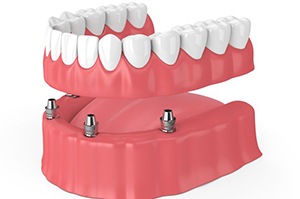
Are you missing one or more teeth? At Preston Bend Dental, Dr. Madhav offers a versatile restorative service – dental implants – to help patients in exactly your situation. With dental implants, you can have a complete smile again, allowing you to reclaim oral health and wellbeing. Dental implants in Plano have a crown-and-root structure that mimics the natural design of teeth. This gives you a strong, stable, and lifelike completed smile that you can rely on. Contact us today to learn more!

With dental implants, a titanium post is surgically placed into your jawbone to serve as a new root. A metal abutment is attached to the implant, allowing Dr. Madhav to secure a custom-made dental crown on top. Multiple implant posts can even be paired with bridges or dentures to bring back several teeth at once.
The unique three-part structure of dental implants sets them apart from other tooth replacements. For one, after they’ve been placed, they fuse to the jawbone in a process called osseointegration. Due to this process, they have the potential to last for decades or even a lifetime with the right care. They also restore more chewing power and feel more natural than alternative solutions. For these reasons and many more, dental implants are usually our first recommendation for patients who are tired of dealing with tooth loss.

Here is a general overview of the dental implant process:

There are many options for tooth replacement available, but in recent years, dental implants have become the gold-standard. Some of the reasons that dental implants are the ideal tooth replacement solution for almost any patient include:

You know that sunken in facial appearance you associate with denture wearers? That occurs due to the diminishment of healthy jawbone density and gum tissue volume that proceeds the loss of one or more teeth. The roots of teeth provide the stimulation necessary to preserve this healthy structure, but without tooth roots, supportive structures are resorbed. Implant posts replace the lost roots of missing teeth, replacing the healthy structure while preserving gum and bone tissue. This ensures your face maintains its healthy, youthful appearance as well.

Following extensive tooth loss, a traditional denture allows patients to regain some of the appearance and function of their healthy smiles, but these removable prosthetics significantly limit the diet as they only restore about 20% of healthy chewing function. Implant retained prosthetics allow patients to eat all of their favorite foods, replacing 70% or more chewing ability.

Traditional replacement options – fixed bridges and dentures – rely on surrounding teeth and gum tissues for support. Unfortunately, this can be hard on the healthy dental tissues, leading to additional damage or further tooth loss. Dental implant posts make these advanced tooth replacement prosthetics completely self-supporting like your healthy, natural teeth, so your remaining teeth and oral structures aren’t adversely impacted by dental implant supported replacement teeth.

Traditional fixed bridges require little or no change to your daily hygiene routine, but more advanced removable denture prosthetics can be difficult to clean, especially if you have arthritis or other concerns that impact dexterity. Implant-supported crowns, bridges, and dentures can be brushed just like your healthy, natural teeth. This is a much better option for many patients.

Worried about the appearance of your fixed bridge, partial, or full denture? Tired of slipping sliding dentures when you’re talking to friends? With a natural feeling and functioning implant denture, you can speak clearly, chew a wide range of foods, and smile with complete confidence.

Dental crowns, bridges, partials, and full dentures need to be repaired or replaced every five to ten years to ensure optimal function. Dental implant-supported replacement teeth can last for two decades or longer with proper care. In fact, these natural looking, feeling, and functioning restoration solutions have a 90 to 95% success rate after 20 years.

Dental implants can be paired with a range of prosthetic options, from single crowns to bridges, partial dentures, and full dentures. This makes dental implants one of the most versatile restorative services currently available. That means even if you’re dealing with severe tooth loss, chances are there’s a way that dental implants can make your smile whole again. Below, you can learn about the many ways that we can restore your missing teeth as well as what makes a person a good candidate for this procedure.

It’s true that dental implants are becoming more and more accessible to people of all ages and backgrounds today than ever before, but there are a few requirements that should be met before treatment is performed. For example, our Preston Bend Dental dentists believe you should have:
If you’ve lost one tooth, we’ll use one implant post to support a custom, tooth-colored dental crown. After the implant fully integrates into your jawbone tissue, an abutment will be attached to keep the restoration stable. Our dental implants are designed to flawlessly mimic the oral structure you’ve lost, leaving you with a beautiful and strong full set of teeth. Your restoration is customized in every way to blend in exactly with your neighboring teeth, ensuring only you and our office know you had a tooth replaced.
To replace several consecutive teeth, a fixed bridge may be attached to two implant posts. One implant will be placed at each end of the row of replacement teeth. Because the implant is strong enough to hold a dedicated restoration on its own, there’s no need to worry about making modifications to your existing teeth just to hold the restoration. This means we can retain as much of your natural enamel as possible, something that could not be said for traditional bridges.
For nonconsecutive missing teeth, an implant partial denture may be a better option. Implant partials fill in the gaps between healthy teeth. These prosthetics are typically attached between two strategically positioned implant posts.
Following the loss of a full row of teeth, an implant denture may be your best option. Dentures can be supported by between four and six dental implant posts. This gives you a secure replacement of your full smile. Depending on your preference, you can have your implant denture fixed in place or removable. Fixed implant dentures are easier to clean and manage day-to-day, however, they can only be removed by a dentist. We’ll be happy to break down their unique differences with you directly. In either case, both options are longer-lasting than traditional dentures and keep your jawbone from changing shape, forcing you to replace your prosthetic after only a few years of use.

The only way to get an accurate estimate of the out-of-pocket costs of implant-supported tooth replacement is to work with one of our knowledgeable team members during a dental implant consultation. There are many variables that impact the cost of your implant supported tooth replacement, including the number and location of missing teeth, materials used, implant and restoration manufacturer, and the need for preparatory treatments. Each step of the implant process – preparatory procedures, implant surgery, abutment placement, and restoration – will be billed separately to help you budget for the cost of treatment over several months.
Whenever possible, we’ll process and file dental insurance claims, and our team can often help you to find low- and no-interest financing options to break the cost of treatment into smaller payments.

Dental implants are successful over 95% of the time. But while failure is rare, it nevertheless is a possibility you should be prepared for. Call our office right away if your implant feels loose, you’re experiencing unusual or severe pain, you’ve noticed bleeding around the implant, or you’re having trouble chewing your food. We’ll figure out what’s causing the problem quickly and tell you what steps can be taken to save your new smile. Sometimes the issue can be dealt with without having to remove the implant; at other times, the posts will need to be taken out altogether and replaced once your mouth is healthy again.

Although dental implants are incredibly durable and can last a lifetime, their longevity will mainly depend on how well you take care of your smile. This means you’ll have to practice certain preventive measures to make the most of your new teeth. Our team at Preston Bend Dental is happy to share several essential habits to follow so that you’re prepared to maintain your pearly whites for many years to come. Read along or give us a call to learn more about dental implant care in Plano!

Keeping your smile clean is one of the most crucial steps in preserving your dental implants. Not only will this remove debris and food particles from between your teeth, but it’ll also prevent more serious oral health issues like gum disease, which can be detrimental to the metal posts. To avoid any future complications, you’ll need to brush for two minutes twice a day, floss daily, and rinse with dentist-approved mouthwash frequently to ensure your smile stays in pristine condition.

Most people know that sugar can cause cavities, but it isn’t the only ingredient that can harm your teeth. Eating processed carbohydrates and starches often can also develop oral health problems over time, like dental decay. Avoid overindulging in sweets and starchy treats, like candy and pretzels. Make sure to also refrain from munching on hard or crunchy meals, which can chip or damage your dental implants. Try switching to more nutritious foods like fruits, veggies, nuts, dairy, and lean proteins which can promote stronger and healthier teeth and gums to support your new teeth.

Do you tend to bite your nails when you’re nervous? Do you typically use your teeth to open packages or bottle caps? While these habits may seem harmless at first, they can easily compromise your natural tooth enamel in the long run. One wrong bite and even your dental implants can become damaged. To preserve a healthy smile, it’s best to keep away from poor oral habits like smoking, biting your fingernails, and chewing ice. Make sure you have appropriate tools handy and chew on sugar-free gum if you’re tempted to bite on anything other than food.

If you enjoy playing sports where there’s a risk of getting hit in the face, you should consider investing in athletic mouthguards. These custom-made appliances can cushion and protect your pearly whites, reducing the chances of you needing to seek emergency dental care. Likewise, you can ask your dentist about nightguards for bruxism if you often grind your teeth in your sleep. This can wear down your enamel and weaken the surface of your teeth, including your dental implants.

Your dentist is one of your biggest allies in maintaining your oral health. By visiting them every six months for checkups and cleanings, they can assess your mouth and dental implants, providing any necessary treatments for developing issues they might detect. They can also recommend best practices for keeping your restorations in good shape, including changes in your lifestyle or diet to promote healthier gums and bones. By treating underlying issues ahead of time, you can save yourself time, money, and headaches from more costly complications down the road.

If you suffer from extensive tooth loss, you’re probably thinking about rebuilding your smile with dental implants in Plano. Although you know more about the process after reading the information above, you may still have a few concerns before committing to treatment. Luckily, we’re here to make finding answers as seamless as possible. Our team at Preston Bend Dental has decided to answer a few of the most common questions we receive from patients. If you’d prefer to speak directly with us, don’t hesitate to reach out and make an appointment !
Right before your oral surgery, your mouth will be numbed with a local anesthetic to ensure you feel no pain during the procedure. Additionally, you’ll most likely be sedated, meaning your body will have a lowered ability to register pain. Even though the surgery itself shouldn’t hurt, your mouth will likely feel sore for the first few days following the procedure. Luckily, you can easily manage your discomfort by taking prescription or over-the-counter pain medication as directed and using cold compresses. If your pain worsens, don’t hesitate to contact our office for assistance.
Although dental implant failure is uncommon, it can occur for one of two reasons: peri-implantitis and failed osseointegration. Peri-implantitis is a form of gum disease that develops from poor oral hygiene, damaging the bone and soft tissue supporting the implant. Meanwhile, failed osseointegration happens when the titanium post doesn’t successfully integrate with the jawbone. A few other causes of dental implant failure include chronic teeth grinding, tobacco use, poor oral hygiene, and certain medications. During your consultation, we’ll explain how you can minimize your risk of implant failure.
Most patients can expect to return to their usual activities the day following their oral surgery. However, it’s incredibly important to avoid intense exercise for the first week or so as it could delay healing. Any bleeding or swelling you experience should stop within the first couple of days after your procedure. You can manage these side effects by taking prescribed or over-the-counter pain medication as directed. One of the most crucial parts of your recovery is osseointegration (the fusion of the implant to the jawbone), which can take up to six months.
It’s strongly recommended that you stick to a soft-food diet for the first few weeks following dental implant surgery. Don’t use a straw, and make sure you avoid tough, alcoholic, sugary, and acidic foods or drinks. Once you’re all healed up, you can eat almost anything you want! However, you’ll want to continue to exercise caution with chewy or hard foods as they can loosen, dislodge, or damage your new smile.

